
7 Types of Homework for Students

Chris Drew (PhD)
Dr. Chris Drew is the founder of the Helpful Professor. He holds a PhD in education and has published over 20 articles in scholarly journals. He is the former editor of the Journal of Learning Development in Higher Education. [Image Descriptor: Photo of Chris]
Learn about our Editorial Process

There are seven types of homework. These are practice, preparation, extension, integration, research, application, and flipped homework.
Each type of homework has its own role for students learning. The important task for teachers is to select homework that will best provide holistic support to a student.
This doesn’t mean just supporting students for the upcoming exams but also ensuring students are not overwhelmed by homework and that they can still live a balanced life outside of school.
Types of Homework
1. practice.
Practice is the most common task students have when they are given homework. It entails attempting to reinforce information learned in school so that students will commit it to long-term memory.
An example of practice homework is math workbooks. Usually, a teacher will complete the math task in class so students know how to do it, then give them a workbook of 20 – 50 tasks to complete overnight to reinforce the task.
The benefit of practice homework is that it can certainly help students commit what they learned in class to memory. This is especially the case if teachers used spaced repetition. This is a strategy whereby the teacher re-introduces things learned in previous weeks and months during homework revision so the information is not lost over time.
The downside of practice homework is that the child is learning on their own during this period. This means that, if the child hasn’t sufficiently learned the content in class, they don’t have anyone to help them during homework time. This can lead to a great deal of frustration and despair for students staring at a piece of paper feeling lost and confused.
Related: Homework Statistics
2. Preparation
Preparation homework is given to students before a lesson so they have the important information at hand before class.
Commonly, this occurs when teachers provide reading materials for students to look over between class. They then come to class having read the materials so they are ready to discuss and debate the topics.
It’s also commonly used in language learning, where it’s called pre-teaching of vocabulary. The teacher provides vocabulary to learn before class so the students can come to class and practice it together.
The benefit of preparation homework is that it bunches a lot of the didactic (non-interactive) parts of learning into the pre-class time so students can spend most of their time in class interacting with the teacher and peers.
The downside of preparation homework is that it rarely works as expected. Teachers often spend the first 10 to 15 minutes of class re-teaching what was supposed to be done for homework either because students found it too hard or they didn’t do the tasks.
3. Extension
Extension homework involves providing students with tasks that are based upon what was learned in class, but goes over and above those tasks.
It is the equivalent of teaching a student to swim then letting them out into the ocean. The students have to apply their knowledge in a new context without the support or ‘ scaffolding ’ of a teacher hovering over their shoulders.
The benefit of extension homework is it can give students a lot of confidence. They can go home and feel as if they’re excelling at their work when they find that they’re doing it without the support of a teacher.
The downside of extension homework is that it can be risky: by definition, students are extending themselves beyond what was learned in class, meaning they will come across new information and new contexts where they might need help that’s not available at the time.
Related: Homework Pros and Cons
4. Integration
Integration homework requires students to bring together, or ‘integrate’, knowledge from various subjects and knowledge areas into one project.
The homework may involve the integration of history lessons with writing lessons to create a book report, or the integration of math with business studies to create a business plan.
Integration is great for students to draw connections between things they have learned in various different classes at school. However, it also involves a lot of complexity that may make students feel confused or overwhelmed.
5. Research
Research homework involves using your time after school and on weekends to gather data that will be discussed in class.
Often, this can involve interviewing family members, taking photos around your community, or looking up information on the internet.
The benefit of research homework is that students often come to class with exciting things to share. They will also come with questions to help stimulate conversation in class.
However, it’s important for teachers to be aware that not all students have access to high-speed internet and other resources to conduct research. In fact, in my homework statistics article, I discussed how a staggering 24% of low-income American teens regularly fail to complete homework due to lack of access to technology.
6. Application
Application homework involves taking knowledge learned in class and applying it to real-world settings.
This is common in immersive language learning settings, for example, when teachers ask students to go out into the streets and practice new vocabulary when ordering a drink or buying food.
The benefit of application homework is that it gives real-world context to what was learned in class. By applying your knowledge, you can more effectively commit it to memory than simply rote learning it at your kitchen table.
Application in a real-world setting provides a context and a story that you can easily pull from your memory in the future, helping you to retain information long-term.
7. Flipped Homework
The flipped learning movement is a movement that involves making students learn at home on their own then come to class to practice it.
For teachers, this means thinking about school as the space for ‘traditional’ homework and home as the space for instruction.
This is increasingly popular with technology and hybrid learning environments. For example, a teacher might assign a YouTube video to watch as homework before class. Then, the class involves dissecting the video and critiquing it.
The benefit of flipped learning is that it maximizes time for constructivist and hands-on active learning in the classroom. The downside is students can get confused during preparation, they may not complete the preparation work, or technology may fail on them.
What are the Functions of Homework?
Homework serves multiple purposes. These include:
- Getting Ahead: Many schools and parents give their children homework (including private tutoring help so their children can have an advantage in life over other children.
- Keeping Up: On a societal level, many governments encourage homework so that students can keep up with other societies in the ‘education race’ of the 21st Century. Some societies, like South Korea, heavily emphasize homework, and others feel they need to keep up.
- Catching Up: Many students are assigned homework to catch up with the rest of their class. If you find a topic very difficult, you may find you need to spend a lot more time on your own working through the information than your peers.
- Retention: Homework helps you to repeat and retain information. With extra practice, you can commit information to memory.
- Excitement: Some well-made homework can get students excited to come to class to discuss what they did.
- Application: Situation-based learning, where you’re applying what you learned in class to real-world situations, can help progress students’ knowledge in ways that you can’t in school.
- Home-School Relationships: Homework also serves the purpose of ensuring parents know what’s going on in school. Many parents like to see what children are learning so they can monitor their children’s progress and keep teachers accountable.
Homework comes in all shapes and sizes. While many teachers stick to the old fashioned repetition homework mode, I’d encourage you to try out a range of other types of homework that can keep students engaged, encourage more discussion and collaboration in class, and ensure that the difficult work where students need the teacher’s help takes place in the classroom. This will provide maximum support for your students, help propel them forward, and prevent arguments for why homework should be banned .

- Chris Drew (PhD) https://helpfulprofessor.com/author/chris-drew-phd-2/ 25 Number Games for Kids (Free and Easy)
- Chris Drew (PhD) https://helpfulprofessor.com/author/chris-drew-phd-2/ 25 Word Games for Kids (Free and Easy)
- Chris Drew (PhD) https://helpfulprofessor.com/author/chris-drew-phd-2/ 25 Outdoor Games for Kids
- Chris Drew (PhD) https://helpfulprofessor.com/author/chris-drew-phd-2/ 50 Incentives to Give to Students
Leave a Comment Cancel Reply
Your email address will not be published. Required fields are marked *

Choose Your Test
- Search Blogs By Category
- College Admissions
- AP and IB Exams
- GPA and Coursework
How to Do Homework: 15 Expert Tips and Tricks
Coursework/GPA

Everyone struggles with homework sometimes, but if getting your homework done has become a chronic issue for you, then you may need a little extra help. That’s why we’ve written this article all about how to do homework. Once you’re finished reading it, you’ll know how to do homework (and have tons of new ways to motivate yourself to do homework)!
We’ve broken this article down into a few major sections. You’ll find:
- A diagnostic test to help you figure out why you’re struggling with homework
- A discussion of the four major homework problems students face, along with expert tips for addressing them
- A bonus section with tips for how to do homework fast
By the end of this article, you’ll be prepared to tackle whatever homework assignments your teachers throw at you .
So let’s get started!

How to Do Homework: Figure Out Your Struggles
Sometimes it feels like everything is standing between you and getting your homework done. But the truth is, most people only have one or two major roadblocks that are keeping them from getting their homework done well and on time.
The best way to figure out how to get motivated to do homework starts with pinpointing the issues that are affecting your ability to get your assignments done. That’s why we’ve developed a short quiz to help you identify the areas where you’re struggling.
Take the quiz below and record your answers on your phone or on a scrap piece of paper. Keep in mind there are no wrong answers!
1. You’ve just been assigned an essay in your English class that’s due at the end of the week. What’s the first thing you do?
A. Keep it in mind, even though you won’t start it until the day before it’s due B. Open up your planner. You’ve got to figure out when you’ll write your paper since you have band practice, a speech tournament, and your little sister’s dance recital this week, too. C. Groan out loud. Another essay? You could barely get yourself to write the last one! D. Start thinking about your essay topic, which makes you think about your art project that’s due the same day, which reminds you that your favorite artist might have just posted to Instagram...so you better check your feed right now.
2. Your mom asked you to pick up your room before she gets home from work. You’ve just gotten home from school. You decide you’ll tackle your chores:
A. Five minutes before your mom walks through the front door. As long as it gets done, who cares when you start? B. As soon as you get home from your shift at the local grocery store. C. After you give yourself a 15-minute pep talk about how you need to get to work. D. You won’t get it done. Between texts from your friends, trying to watch your favorite Netflix show, and playing with your dog, you just lost track of time!
3. You’ve signed up to wash dogs at the Humane Society to help earn money for your senior class trip. You:
A. Show up ten minutes late. You put off leaving your house until the last minute, then got stuck in unexpected traffic on the way to the shelter. B. Have to call and cancel at the last minute. You forgot you’d already agreed to babysit your cousin and bake cupcakes for tomorrow’s bake sale. C. Actually arrive fifteen minutes early with extra brushes and bandanas you picked up at the store. You’re passionate about animals, so you’re excited to help out! D. Show up on time, but only get three dogs washed. You couldn’t help it: you just kept getting distracted by how cute they were!
4. You have an hour of downtime, so you decide you’re going to watch an episode of The Great British Baking Show. You:
A. Scroll through your social media feeds for twenty minutes before hitting play, which means you’re not able to finish the whole episode. Ugh! You really wanted to see who was sent home! B. Watch fifteen minutes until you remember you’re supposed to pick up your sister from band practice before heading to your part-time job. No GBBO for you! C. You finish one episode, then decide to watch another even though you’ve got SAT studying to do. It’s just more fun to watch people make scones. D. Start the episode, but only catch bits and pieces of it because you’re reading Twitter, cleaning out your backpack, and eating a snack at the same time.
5. Your teacher asks you to stay after class because you’ve missed turning in two homework assignments in a row. When she asks you what’s wrong, you say:
A. You planned to do your assignments during lunch, but you ran out of time. You decided it would be better to turn in nothing at all than submit unfinished work. B. You really wanted to get the assignments done, but between your extracurriculars, family commitments, and your part-time job, your homework fell through the cracks. C. You have a hard time psyching yourself to tackle the assignments. You just can’t seem to find the motivation to work on them once you get home. D. You tried to do them, but you had a hard time focusing. By the time you realized you hadn’t gotten anything done, it was already time to turn them in.
Like we said earlier, there are no right or wrong answers to this quiz (though your results will be better if you answered as honestly as possible). Here’s how your answers break down:
- If your answers were mostly As, then your biggest struggle with doing homework is procrastination.
- If your answers were mostly Bs, then your biggest struggle with doing homework is time management.
- If your answers were mostly Cs, then your biggest struggle with doing homework is motivation.
- If your answers were mostly Ds, then your biggest struggle with doing homework is getting distracted.
Now that you’ve identified why you’re having a hard time getting your homework done, we can help you figure out how to fix it! Scroll down to find your core problem area to learn more about how you can start to address it.
And one more thing: you’re really struggling with homework, it’s a good idea to read through every section below. You may find some additional tips that will help make homework less intimidating.

How to Do Homework When You’re a Procrastinator
Merriam Webster defines “procrastinate” as “to put off intentionally and habitually.” In other words, procrastination is when you choose to do something at the last minute on a regular basis. If you’ve ever found yourself pulling an all-nighter, trying to finish an assignment between periods, or sprinting to turn in a paper minutes before a deadline, you’ve experienced the effects of procrastination.
If you’re a chronic procrastinator, you’re in good company. In fact, one study found that 70% to 95% of undergraduate students procrastinate when it comes to doing their homework. Unfortunately, procrastination can negatively impact your grades. Researchers have found that procrastination can lower your grade on an assignment by as much as five points ...which might not sound serious until you realize that can mean the difference between a B- and a C+.
Procrastination can also negatively affect your health by increasing your stress levels , which can lead to other health conditions like insomnia, a weakened immune system, and even heart conditions. Getting a handle on procrastination can not only improve your grades, it can make you feel better, too!
The big thing to understand about procrastination is that it’s not the result of laziness. Laziness is defined as being “disinclined to activity or exertion.” In other words, being lazy is all about doing nothing. But a s this Psychology Today article explains , procrastinators don’t put things off because they don’t want to work. Instead, procrastinators tend to postpone tasks they don’t want to do in favor of tasks that they perceive as either more important or more fun. Put another way, procrastinators want to do things...as long as it’s not their homework!
3 Tips f or Conquering Procrastination
Because putting off doing homework is a common problem, there are lots of good tactics for addressing procrastination. Keep reading for our three expert tips that will get your homework habits back on track in no time.
#1: Create a Reward System
Like we mentioned earlier, procrastination happens when you prioritize other activities over getting your homework done. Many times, this happens because homework...well, just isn’t enjoyable. But you can add some fun back into the process by rewarding yourself for getting your work done.
Here’s what we mean: let’s say you decide that every time you get your homework done before the day it’s due, you’ll give yourself a point. For every five points you earn, you’ll treat yourself to your favorite dessert: a chocolate cupcake! Now you have an extra (delicious!) incentive to motivate you to leave procrastination in the dust.
If you’re not into cupcakes, don’t worry. Your reward can be anything that motivates you . Maybe it’s hanging out with your best friend or an extra ten minutes of video game time. As long as you’re choosing something that makes homework worth doing, you’ll be successful.
#2: Have a Homework Accountability Partner
If you’re having trouble getting yourself to start your homework ahead of time, it may be a good idea to call in reinforcements . Find a friend or classmate you can trust and explain to them that you’re trying to change your homework habits. Ask them if they’d be willing to text you to make sure you’re doing your homework and check in with you once a week to see if you’re meeting your anti-procrastination goals.
Sharing your goals can make them feel more real, and an accountability partner can help hold you responsible for your decisions. For example, let’s say you’re tempted to put off your science lab write-up until the morning before it’s due. But you know that your accountability partner is going to text you about it tomorrow...and you don’t want to fess up that you haven’t started your assignment. A homework accountability partner can give you the extra support and incentive you need to keep your homework habits on track.
#3: Create Your Own Due Dates
If you’re a life-long procrastinator, you might find that changing the habit is harder than you expected. In that case, you might try using procrastination to your advantage! If you just can’t seem to stop doing your work at the last minute, try setting your own due dates for assignments that range from a day to a week before the assignment is actually due.
Here’s what we mean. Let’s say you have a math worksheet that’s been assigned on Tuesday and is due on Friday. In your planner, you can write down the due date as Thursday instead. You may still put off your homework assignment until the last minute...but in this case, the “last minute” is a day before the assignment’s real due date . This little hack can trick your procrastination-addicted brain into planning ahead!

If you feel like Kevin Hart in this meme, then our tips for doing homework when you're busy are for you.
How to Do Homework When You’re too Busy
If you’re aiming to go to a top-tier college , you’re going to have a full plate. Because college admissions is getting more competitive, it’s important that you’re maintaining your grades , studying hard for your standardized tests , and participating in extracurriculars so your application stands out. A packed schedule can get even more hectic once you add family obligations or a part-time job to the mix.
If you feel like you’re being pulled in a million directions at once, you’re not alone. Recent research has found that stress—and more severe stress-related conditions like anxiety and depression— are a major problem for high school students . In fact, one study from the American Psychological Association found that during the school year, students’ stress levels are higher than those of the adults around them.
For students, homework is a major contributor to their overall stress levels . Many high schoolers have multiple hours of homework every night , and figuring out how to fit it into an already-packed schedule can seem impossible.
3 Tips for Fitting Homework Into Your Busy Schedule
While it might feel like you have literally no time left in your schedule, there are still ways to make sure you’re able to get your homework done and meet your other commitments. Here are our expert homework tips for even the busiest of students.
#1: Make a Prioritized To-Do List
You probably already have a to-do list to keep yourself on track. The next step is to prioritize the items on your to-do list so you can see what items need your attention right away.
Here’s how it works: at the beginning of each day, sit down and make a list of all the items you need to get done before you go to bed. This includes your homework, but it should also take into account any practices, chores, events, or job shifts you may have. Once you get everything listed out, it’s time to prioritize them using the labels A, B, and C. Here’s what those labels mean:
- A Tasks : tasks that have to get done—like showing up at work or turning in an assignment—get an A.
- B Tasks : these are tasks that you would like to get done by the end of the day but aren’t as time sensitive. For example, studying for a test you have next week could be a B-level task. It’s still important, but it doesn’t have to be done right away.
- C Tasks: these are tasks that aren’t very important and/or have no real consequences if you don’t get them done immediately. For instance, if you’re hoping to clean out your closet but it’s not an assigned chore from your parents, you could label that to-do item with a C.
Prioritizing your to-do list helps you visualize which items need your immediate attention, and which items you can leave for later. A prioritized to-do list ensures that you’re spending your time efficiently and effectively, which helps you make room in your schedule for homework. So even though you might really want to start making decorations for Homecoming (a B task), you’ll know that finishing your reading log (an A task) is more important.
#2: Use a Planner With Time Labels
Your planner is probably packed with notes, events, and assignments already. (And if you’re not using a planner, it’s time to start!) But planners can do more for you than just remind you when an assignment is due. If you’re using a planner with time labels, it can help you visualize how you need to spend your day.
A planner with time labels breaks your day down into chunks, and you assign tasks to each chunk of time. For example, you can make a note of your class schedule with assignments, block out time to study, and make sure you know when you need to be at practice. Once you know which tasks take priority, you can add them to any empty spaces in your day.
Planning out how you spend your time not only helps you use it wisely, it can help you feel less overwhelmed, too . We’re big fans of planners that include a task list ( like this one ) or have room for notes ( like this one ).
#3: Set Reminders on Your Phone
If you need a little extra nudge to make sure you’re getting your homework done on time, it’s a good idea to set some reminders on your phone. You don’t need a fancy app, either. You can use your alarm app to have it go off at specific times throughout the day to remind you to do your homework. This works especially well if you have a set homework time scheduled. So if you’ve decided you’re doing homework at 6:00 pm, you can set an alarm to remind you to bust out your books and get to work.
If you use your phone as your planner, you may have the option to add alerts, emails, or notifications to scheduled events . Many calendar apps, including the one that comes with your phone, have built-in reminders that you can customize to meet your needs. So if you block off time to do your homework from 4:30 to 6:00 pm, you can set a reminder that will pop up on your phone when it’s time to get started.

This dog isn't judging your lack of motivation...but your teacher might. Keep reading for tips to help you motivate yourself to do your homework.
How to Do Homework When You’re Unmotivated
At first glance, it may seem like procrastination and being unmotivated are the same thing. After all, both of these issues usually result in you putting off your homework until the very last minute.
But there’s one key difference: many procrastinators are working, they’re just prioritizing work differently. They know they’re going to start their homework...they’re just going to do it later.
Conversely, people who are unmotivated to do homework just can’t find the willpower to tackle their assignments. Procrastinators know they’ll at least attempt the homework at the last minute, whereas people who are unmotivated struggle with convincing themselves to do it at a ll. For procrastinators, the stress comes from the inevitable time crunch. For unmotivated people, the stress comes from trying to convince themselves to do something they don’t want to do in the first place.
Here are some common reasons students are unmotivated in doing homework :
- Assignments are too easy, too hard, or seemingly pointless
- Students aren’t interested in (or passionate about) the subject matter
- Students are intimidated by the work and/or feels like they don’t understand the assignment
- Homework isn’t fun, and students would rather spend their time on things that they enjoy
To sum it up: people who lack motivation to do their homework are more likely to not do it at all, or to spend more time worrying about doing their homework than...well, actually doing it.
3 Tips for How to Get Motivated to Do Homework
The key to getting homework done when you’re unmotivated is to figure out what does motivate you, then apply those things to homework. It sounds tricky...but it’s pretty simple once you get the hang of it! Here are our three expert tips for motivating yourself to do your homework.
#1: Use Incremental Incentives
When you’re not motivated, it’s important to give yourself small rewards to stay focused on finishing the task at hand. The trick is to keep the incentives small and to reward yourself often. For example, maybe you’re reading a good book in your free time. For every ten minutes you spend on your homework, you get to read five pages of your book. Like we mentioned earlier, make sure you’re choosing a reward that works for you!
So why does this technique work? Using small rewards more often allows you to experience small wins for getting your work done. Every time you make it to one of your tiny reward points, you get to celebrate your success, which gives your brain a boost of dopamine . Dopamine helps you stay motivated and also creates a feeling of satisfaction when you complete your homework !
#2: Form a Homework Group
If you’re having trouble motivating yourself, it’s okay to turn to others for support. Creating a homework group can help with this. Bring together a group of your friends or classmates, and pick one time a week where you meet and work on homework together. You don’t have to be in the same class, or even taking the same subjects— the goal is to encourage one another to start (and finish!) your assignments.
Another added benefit of a homework group is that you can help one another if you’re struggling to understand the material covered in your classes. This is especially helpful if your lack of motivation comes from being intimidated by your assignments. Asking your friends for help may feel less scary than talking to your teacher...and once you get a handle on the material, your homework may become less frightening, too.
#3: Change Up Your Environment
If you find that you’re totally unmotivated, it may help if you find a new place to do your homework. For example, if you’ve been struggling to get your homework done at home, try spending an extra hour in the library after school instead. The change of scenery can limit your distractions and give you the energy you need to get your work done.
If you’re stuck doing homework at home, you can still use this tip. For instance, maybe you’ve always done your homework sitting on your bed. Try relocating somewhere else, like your kitchen table, for a few weeks. You may find that setting up a new “homework spot” in your house gives you a motivational lift and helps you get your work done.

Social media can be a huge problem when it comes to doing homework. We have advice for helping you unplug and regain focus.
How to Do Homework When You’re Easily Distracted
We live in an always-on world, and there are tons of things clamoring for our attention. From friends and family to pop culture and social media, it seems like there’s always something (or someone!) distracting us from the things we need to do.
The 24/7 world we live in has affected our ability to focus on tasks for prolonged periods of time. Research has shown that over the past decade, an average person’s attention span has gone from 12 seconds to eight seconds . And when we do lose focus, i t takes people a long time to get back on task . One study found that it can take as long as 23 minutes to get back to work once we’ve been distracte d. No wonder it can take hours to get your homework done!
3 Tips to Improve Your Focus
If you have a hard time focusing when you’re doing your homework, it’s a good idea to try and eliminate as many distractions as possible. Here are three expert tips for blocking out the noise so you can focus on getting your homework done.
#1: Create a Distraction-Free Environment
Pick a place where you’ll do your homework every day, and make it as distraction-free as possible. Try to find a location where there won’t be tons of noise, and limit your access to screens while you’re doing your homework. Put together a focus-oriented playlist (or choose one on your favorite streaming service), and put your headphones on while you work.
You may find that other people, like your friends and family, are your biggest distraction. If that’s the case, try setting up some homework boundaries. Let them know when you’ll be working on homework every day, and ask them if they’ll help you keep a quiet environment. They’ll be happy to lend a hand!
#2: Limit Your Access to Technology
We know, we know...this tip isn’t fun, but it does work. For homework that doesn’t require a computer, like handouts or worksheets, it’s best to put all your technology away . Turn off your television, put your phone and laptop in your backpack, and silence notifications on any wearable tech you may be sporting. If you listen to music while you work, that’s fine...but make sure you have a playlist set up so you’re not shuffling through songs once you get started on your homework.
If your homework requires your laptop or tablet, it can be harder to limit your access to distractions. But it’s not impossible! T here are apps you can download that will block certain websites while you’re working so that you’re not tempted to scroll through Twitter or check your Facebook feed. Silence notifications and text messages on your computer, and don’t open your email account unless you absolutely have to. And if you don’t need access to the internet to complete your assignments, turn off your WiFi. Cutting out the online chatter is a great way to make sure you’re getting your homework done.
#3: Set a Timer (the Pomodoro Technique)
Have you ever heard of the Pomodoro technique ? It’s a productivity hack that uses a timer to help you focus!
Here’s how it works: first, set a timer for 25 minutes. This is going to be your work time. During this 25 minutes, all you can do is work on whatever homework assignment you have in front of you. No email, no text messaging, no phone calls—just homework. When that timer goes off, you get to take a 5 minute break. Every time you go through one of these cycles, it’s called a “pomodoro.” For every four pomodoros you complete, you can take a longer break of 15 to 30 minutes.
The pomodoro technique works through a combination of boundary setting and rewards. First, it gives you a finite amount of time to focus, so you know that you only have to work really hard for 25 minutes. Once you’ve done that, you’re rewarded with a short break where you can do whatever you want. Additionally, tracking how many pomodoros you complete can help you see how long you’re really working on your homework. (Once you start using our focus tips, you may find it doesn’t take as long as you thought!)

Two Bonus Tips for How to Do Homework Fast
Even if you’re doing everything right, there will be times when you just need to get your homework done as fast as possible. (Why do teachers always have projects due in the same week? The world may never know.)
The problem with speeding through homework is that it’s easy to make mistakes. While turning in an assignment is always better than not submitting anything at all, you want to make sure that you’re not compromising quality for speed. Simply put, the goal is to get your homework done quickly and still make a good grade on the assignment!
Here are our two bonus tips for getting a decent grade on your homework assignments , even when you’re in a time crunch.
#1: Do the Easy Parts First
This is especially true if you’re working on a handout with multiple questions. Before you start working on the assignment, read through all the questions and problems. As you do, make a mark beside the questions you think are “easy” to answer .
Once you’ve finished going through the whole assignment, you can answer these questions first. Getting the easy questions out of the way as quickly as possible lets you spend more time on the trickier portions of your homework, which will maximize your assignment grade.
(Quick note: this is also a good strategy to use on timed assignments and tests, like the SAT and the ACT !)
#2: Pay Attention in Class
Homework gets a lot easier when you’re actively learning the material. Teachers aren’t giving you homework because they’re mean or trying to ruin your weekend... it’s because they want you to really understand the course material. Homework is designed to reinforce what you’re already learning in class so you’ll be ready to tackle harder concepts later.
When you pay attention in class, ask questions, and take good notes, you’re absorbing the information you’ll need to succeed on your homework assignments. (You’re stuck in class anyway, so you might as well make the most of it!) Not only will paying attention in class make your homework less confusing, it will also help it go much faster, too.

What’s Next?
If you’re looking to improve your productivity beyond homework, a good place to begin is with time management. After all, we only have so much time in a day...so it’s important to get the most out of it! To get you started, check out this list of the 12 best time management techniques that you can start using today.
You may have read this article because homework struggles have been affecting your GPA. Now that you’re on the path to homework success, it’s time to start being proactive about raising your grades. This article teaches you everything you need to know about raising your GPA so you can
Now you know how to get motivated to do homework...but what about your study habits? Studying is just as critical to getting good grades, and ultimately getting into a good college . We can teach you how to study bette r in high school. (We’ve also got tons of resources to help you study for your ACT and SAT exams , too!)
These recommendations are based solely on our knowledge and experience. If you purchase an item through one of our links, PrepScholar may receive a commission.
Trending Now
How to Get Into Harvard and the Ivy League
How to Get a Perfect 4.0 GPA
How to Write an Amazing College Essay
What Exactly Are Colleges Looking For?
ACT vs. SAT: Which Test Should You Take?
When should you take the SAT or ACT?
Get Your Free

Find Your Target SAT Score
Free Complete Official SAT Practice Tests
How to Get a Perfect SAT Score, by an Expert Full Scorer
Score 800 on SAT Math
Score 800 on SAT Reading and Writing
How to Improve Your Low SAT Score
Score 600 on SAT Math
Score 600 on SAT Reading and Writing
Find Your Target ACT Score
Complete Official Free ACT Practice Tests
How to Get a Perfect ACT Score, by a 36 Full Scorer
Get a 36 on ACT English
Get a 36 on ACT Math
Get a 36 on ACT Reading
Get a 36 on ACT Science
How to Improve Your Low ACT Score
Get a 24 on ACT English
Get a 24 on ACT Math
Get a 24 on ACT Reading
Get a 24 on ACT Science
Stay Informed
Get the latest articles and test prep tips!

Ashley Sufflé Robinson has a Ph.D. in 19th Century English Literature. As a content writer for PrepScholar, Ashley is passionate about giving college-bound students the in-depth information they need to get into the school of their dreams.
Ask a Question Below
Have any questions about this article or other topics? Ask below and we'll reply!
- View all teaching vacancies
- View all locations
- Barking & Dagenham
- View all subjects
- Business studies & Economics
- Sociology & Psychology
- View all job types
- Primary school
- Secondary school
- View our variety of SEND roles
Online Portal
If you are registered to work with us already, you can log in here
Register to work with us

Your Career• 3 Min read
6th September 2020
Creative Homework Ideas
How can you create homework assignments that build on the day’s lessons and encourage creative, student-led learning? It’s a challenge for most teachers, especially as motivating pupils to complete homework can add a whole extra layer to your lesson plans. But it’s essential to bridge the gap between teacher and student learning – the skills gained through independent study reinforces knowledge from your class, as well as a host of other benefits:
- Extended learning time – outside of the constraints of the school day, students are free to learn at their own pace and in their own environment.
- Independent learning – vital skills for exam preparation and higher education
- Teaches students to be resourceful and to overcome challenges independently.
- Gives students the freedom to be creative in their learning, gain valuable problem-solving skills and confidence in their own abilities.
Tips For Setting Creative Homework
- Plan independent learning both in and out of the classroom – you can monitor students effectiveness and address issues that may arise in the classroom before they become problematic for pupils at home.
- Don’t leave homework assignment to the end of the lesson, rushing through the task might leave some students confused which inevitably leads to a lower homework completion rate. Write plenty of time for explaining homework assignments into your lesson planning – read our Beginner’s Guide To Lesson Planning here
- Homework should to not too easy nor not too hard, offering pupils a challenge that reinforced the topics learnt during the day
- Give room for creative expression – allowing students to add their own diagrams, decorations or chose their own project topics from a selection.
- Try using peer or self-assessment to mark homework – a double whammy of reducing your workload and allowing pupils to take control of their own learning.
- Include timings and explicit steps for completing more complicated assignments, especially for pupils that you anticipate might struggle. Comprehension of the task is the biggest hurdle in getting pupils to work on an independent basis.
- Self-driven projects, posters, creative tasks and research are more exciting than standard comprehension tasks and might encourage pupils that find sitting and writing dull or hard to complete the homework set – give students the freedom to learn and be creative in their home study.
- Provide specific instructions and internet safety reminders for research-led assignments. It’s very easy for children to find research overwhelming with a vast amount of information available online. Provide suggested websites and links in your homework to keep things on track!
- Don’t introduce a new topic for homework – keep it to topics that you’ve already covered in class
- Taking note of the subjects that excite and engage your class and set homework accordingly – try keeping dryer topics and for the classroom so that you can monitor engagement
- Mark work promptly – essential to keep students motivated to complete work in their own time!
- Offering students the opportunity to select the homework that they would like to do from a selection guarantees a higher rate of completion. We’ve seen some teachers create grids or sheets of homework assignments for the pupils to select, or offer baskets of activities for younger children to take home and complete with an adult.
Creative Homework Ideas For All Ages
Coming up with innovative ways for students to reinforce their knowledge at home can be difficult – many of these ideas would be suitable for lots of subjects with a little tweaking!
Book a CCS Consultation
Our East Anglia team are on hand to support your school or MAT with bespoke recruitment solutions, arrange a consultation with the team today.
Recommended for you
Preparing to become a school teacher.
Becoming a school teacher can be a rewarding and fulfilling career choice....
- Your Career
Top 10 Interview Questions for Teaching Assistants
Preparing for an interview can be incredibly daunting, especially if you’ve never...
How teachers can make the most of their summer holidays
Aside from the sleep, eat, repeat cycle that many teachers find themselves...
You're now visiting Engage Education, United Kingdom
Take a look at some of the fantastic opportunities we’re currently recruiting for in the UK.
Privacy Overview
Creating a Homework Policy With Meaning and Purpose
- Tips & Strategies
- An Introduction to Teaching
- Policies & Discipline
- Community Involvement
- School Administration
- Technology in the Classroom
- Teaching Adult Learners
- Issues In Education
- Teaching Resources
- Becoming A Teacher
- Assessments & Tests
- Elementary Education
- Secondary Education
- Special Education
- Homeschooling
- M.Ed., Educational Administration, Northeastern State University
- B.Ed., Elementary Education, Oklahoma State University
We have all had time-consuming, monotonous, meaningless homework assigned to us at some point in our life. These assignments often lead to frustration and boredom and students learn virtually nothing from them. Teachers and schools must reevaluate how and why they assign homework to their students. Any assigned homework should have a purpose.
Assigning homework with a purpose means that through completing the assignment, the student will be able to obtain new knowledge, a new skill, or have a new experience that they may not otherwise have. Homework should not consist of a rudimentary task that is being assigned simply for the sake of assigning something. Homework should be meaningful. It should be viewed as an opportunity to allow students to make real-life connections to the content that they are learning in the classroom. It should be given only as an opportunity to help increase their content knowledge in an area.
Differentiate Learning for All Students
Furthermore, teachers can utilize homework as an opportunity to differentiate learning for all students. Homework should rarely be given with a blanket "one size fits all" approach. Homework provides teachers with a significant opportunity to meet each student where they are and truly extend learning. A teacher can give their higher-level students more challenging assignments while also filling gaps for those students who may have fallen behind. Teachers who use homework as an opportunity to differentiate we not only see increased growth in their students, but they will also find they have more time in class to dedicate to whole group instruction .
See Student Participation Increase
Creating authentic and differentiated homework assignments can take more time for teachers to put together. As often is the case, extra effort is rewarded. Teachers who assign meaningful, differentiated, connected homework assignments not only see student participation increase, they also see an increase in student engagement. These rewards are worth the extra investment in time needed to construct these types of assignments.
Schools must recognize the value in this approach. They should provide their teachers with professional development that gives them the tools to be successful in transitioning to assign homework that is differentiated with meaning and purpose. A school's homework policy should reflect this philosophy; ultimately guiding teachers to give their students reasonable, meaningful, purposeful homework assignments.
Sample School Homework Policy
Homework is defined as the time students spend outside the classroom in assigned learning activities. Anywhere Schools believes the purpose of homework should be to practice, reinforce, or apply acquired skills and knowledge. We also believe as research supports that moderate assignments completed and done well are more effective than lengthy or difficult ones done poorly.
Homework serves to develop regular study skills and the ability to complete assignments independently. Anywhere Schools further believes completing homework is the responsibility of the student, and as students mature they are more able to work independently. Therefore, parents play a supportive role in monitoring completion of assignments, encouraging students’ efforts and providing a conducive environment for learning.
Individualized Instruction
Homework is an opportunity for teachers to provide individualized instruction geared specifically to an individual student. Anywhere Schools embraces the idea that each student is different and as such, each student has their own individual needs. We see homework as an opportunity to tailor lessons specifically for an individual student meeting them where they are and bringing them to where we want them to be.
Homework contributes toward building responsibility, self-discipline, and lifelong learning habits. It is the intention of the Anywhere School staff to assign relevant, challenging, meaningful, and purposeful homework assignments that reinforce classroom learning objectives. Homework should provide students with the opportunity to apply and extend the information they have learned complete unfinished class assignments, and develop independence.
The actual time required to complete assignments will vary with each student’s study habits, academic skills, and selected course load. If your child is spending an inordinate amount of time doing homework, you should contact your child’s teachers.
- Teacher Housekeeping Tasks
- Collecting Homework in the Classroom
- Dealing With Trips to the Bathroom During Class
- Classroom Procedures
- Planning Classroom Instruction
- 10 Strategies to Increase Student Reading Comprehension
- The Many Purposes of Education
- Creating a Great Lesson to Maximize Student Learning
- Classroom Rules for High School Students
- Methods for Presenting Subject Matter
- Pros and Cons to Flexible Grouping in Middle and High School
- The Pros and Cons of Block Schedules
- Stop Classroom Clutter
- Assignment Biography: Student Criteria and Rubric for Writing
- Wait Time in Education
- Why Students Cheat and How to Stop Them

- Mathematics
- Reading and Writing
- Intervention
- Professional Learning
- Virtual Events
- What is Phonics?
- Teaching Grammar
- Vocabulary Games
- What is Virtual Learning?
- About Sadlier
- Find a Sales Representative
- International Distributors
- International Programs
- Online Catalogs
- Sadlier School Site Map
- Pricing & Ordering Information
- Sadlier’s W-9
- Sadlier’s Sole Source Letter
- Sadlier’s Credit Application
- Privacy Policy
- Return Policy
- Terms & Conditions
Sadlier's English Language Arts Blog

- Author Interviews
- Interactive Read Alouds
- Close Reading
- Vocabulary/Vocab Gal
- Writing with Vocabulary
- Assessments
- Charts/Posters
- Graphic Organizers
- Back to School
- End of School
- Classroom Management
- Grammar & Writing
- Thinking Routines
- About Our Bloggers
November 7, 2018 VG Teaching Resources Vocab & ELA Res , Vocab Gal , ELA K-5 , ELA Seasonal Back to School , ELA 6-8 , ELA Resources - Activities , ELA 9-12 , ELA PD - Classroom Management , ELA PD - Vocabulary , ELA Focus - Writing with Vocabulary , ELA Focus - Vocabulary
11 vocabulary homework ideas and how to motivate students to do it, by: vocab gal.
Homework is such a valuable formative assessment for both teachers and students, and yet students are motivated* by many different factors when it comes to their desire to actually complete the work. In this article, I'm sharing how to motivate students to do their homework and 11 vocabulary homework ideas and worksheets that work in grades 1–12. Plus, preview and grab my 7 Options for Vocabulary Homework Kit .
Keep scrolling to find vocabulary homework ideas!
How to motivate students to do their homework.
As a teacher, I try to concentrate students’ learning on activities done in class, because asking some students to complete work at home can be daunting. Many times in my career I have been discouraged when more than half the class does not return to class with their homework assignment complete.
Yet we only have so many minutes with our students, and we need them to practice the concepts and skills they are learning until the knowledge becomes ingrained. Most students have a homeroom, study hall, or other downtime during the day in which they could complete activities, they just have to be motivated to do it.
Many studies cite “student choice” as one of the most important factors in inspiring students to learn. When students have the opportunity to select what questions to answer, what activity to complete or what role to play, they tend to feel more comfortable and confident about performing.
Additionally, research shows that when students are dedicated to a task important to them, like improving their video game scores, or optimizing their success on a playing field, they will go to great lengths to improve. While probably not as meaningful as their video game level, students will be more excited to answer questions about themselves than a generic worksheet.
By providing students with both choice and a topic that is personally meaningful, homework can be a great learning exercise as well as an important formative assessment.
Steps to Ensure Students Complete Homework
There are a few other motivating factors that can help establish homework as a meaningful part of a student’s educational experience. Here are suggested steps a school, parish, department, or teacher might take to ensure successful homework completion.
Step One First, confirm that students have a strong rapport with their teacher(s). While it is difficult to cultivate a deep relationship with each student, teachers should strive to show students that they value their students and are committed to helping them learn and grow to their fullest potential. I would encourage teachers not to assign homework for the first few weeks of school until they develop a classroom community of respect and appreciation for learning.
Step Two Second, once the classroom community has been established, teachers should specifically explain the importance of homework as a way of deeply ingraining knowledge. Teachers should also make it clear that homework is a meaningful formative assessment where both they and their students can understand what students know and where there are knowledge gaps.
Step Three Third, some students may be quite unhappy when being mandated to do specific work. Therefore, teachers should stress the choices a student gets when completing their homework and that students get to complete the work that best reflects their own sense of self.
Step Four Finally, the teacher should praise students individually, as well as praise the class when homework is turned in on time. Many students thrive on positive reinforcement and also many may feel guilt if they let their classmates or teacher down. Additionally, as many teachers know, a word of encouragement or a small sticker can make the difference to many.
How to Respond When Homework is Not Completed
When at last it comes time for homework collection, there will be students who did not complete the assignment, no matter how well it was set up. Teachers can again encourage students who did not complete the homework in time to think about what may motivate them to complete it. If a student seems to dislike direct mandates, providing support such as, “I know that you value your learning and will find a way to demonstrate your abilities,” might be more effective than, “Turn in your paper by Thursday or it’s a zero!”
For others who seem driven by the need to please or help others, teachers might encourage students by stating, “I’m disappointed that you weren’t able to complete your work on time, and I know you will submit your work in order to show us both what you know and understand,” might work better than, “Don’t you want the credit for this assignment?”
Vocabulary Homework Ideas for Students
For this post, I have a few homework assignments that model these ideas. Both in my new It's All About Me vocabulary practice page, and my tried-and true, 7 Options for Vocabulary Homework bundle, students are motivated to continue their learning because they have both choice and a focus on themselves, a topic in which they are already invested.
My new It's All About Me Vocabulary Activity tasks students with answering a series of questions about themselves using vocabulary words in context. On the first page of this download students will list their vocabulary words and write their own brief definitions. On the second page student will answer eight prompts. Each response should include at least one of the vocabulary words from their list in context . In each of their answers students must underline the context clues that would help someone unfamiliar with the word understand what it means.
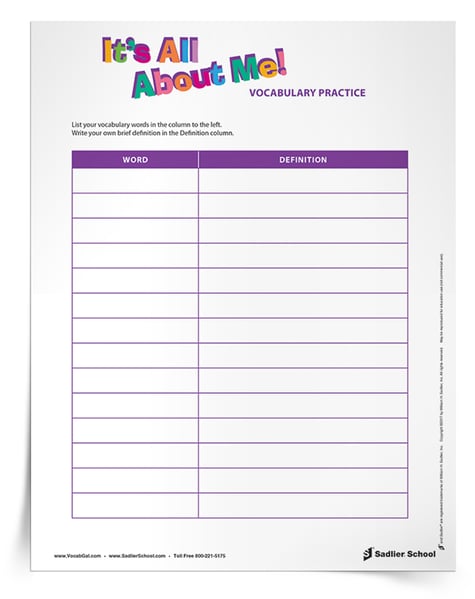
With the 7 Options for Vocabulary Homework bundle, students can choose from a variety of fun and engaging activities for learning or reviewing vocabulary words. In addition to the homework selection sheet, the bundle includes worksheets for vocabulary homework ideas number five and six. The other vocabulary homework options can be completed on a plain piece of paper or in student workbooks.
Here are the vocabulary activities listed on the 7 Options for Vocabulary Homework handout:

#1 Say Your Words
Do you love the sound of your own voice? Do you tend to learn information by teaching others? Then try saying each of the vocabulary words, out loud and in context, to friends, family, strangers, etc. Use either your flashcards or your list of words, and make sure to get initials from someone who heard you say your vocabulary sentence. If you can’t get a signature, just explain when and how you said the sentences and we will invoke the HONOR SYSTEM! Create two sentences per word.
Do you love to write? Do you copy your notes to help you remember information? Then try writing two sentences for each vocabulary word. These can either be two individual sentences for each word or you can put all of your words together in a story. (If you write a story, you only have to use each word once). Have fun and get creative – amuse me and impress me, but make sure you use your vocabulary words in context!
#3 Write Your Words in Other Classes
As an alternative to the above “Write your Words,” use your vocabulary in your assignments for other classes – social studies essays, science notes, art descriptions, etc. Write down the vocabulary you used for this assignment (For example: On my science test I said “Newton was meritorious,” etc.). You can abbreviate your explanations slightly, as long as I understand you know the word’s meaning; remember to use each word twice.
#4 Become Your Words
Do you gesture when you talk? Is it hard for you to sit still? Then consider creating motions to go along with your words. Cry for lament , raise your arms in praise for approbation , etc. See me during class to “perform” your motions, or write them down, making sure that the connection between word, meaning, and gesture makes sense.
#5 Draw Your Words
Are you an artist? Do you constantly doodle? Then create cartoons or drawings that illustrate each word’s meaning. Create one drawing or cartoon per word and make them neat, using clean white paper (consider using recycled paper that has printing on the other side). Paperclip all your drawings together for the end of the week.

#6 Sing Your Words
Do you love to sing? Are you constantly creating your own raps? Try rewriting the lyrics to a song to incorporate each of your vocabulary words or write your own song, rap, etc. You can also write poetry; regardless of the form you choose, the words should be used in the correct context.
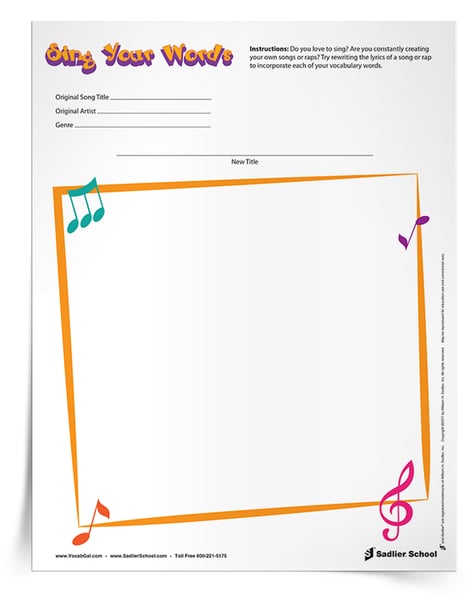
#7 Test Your Words
Do you want to play teacher and write the test as well as take it? Now you can! Create a vocabulary test using all the words in a variety of different types of questions. Make sure to create the answer key to the test as well.
Download the 7 Options for Vocabulary Homework bundle and have students keep the selection sheet in their binders. Now they have seven weeks of vocabulary homework assignments!
Additional Vocabulary Homework Ideas
|
|
|
|
Ultimately, establishing a culture of community and trust in the classroom, explaining the reasoning behind and the benefits of homework, and providing choice and meaningful topics can make a significant difference in completion rates. Even if homework is not completed on time, teachers can still work to connect with each student to provide motivation to complete the assignments.
As educators, we all strive to make learning exciting and applicable to our students. By setting up clear expectations and providing interesting options, we can make any homework, including vocabulary homework, meaningful and valuable to students.
*I have recently completed Gretchen Rubin’s audiobook The Four Tendencies about what motivates different groups of people. Many of the ideas about motivating students come loosely from her book as well as my own observations. I highly recommend the book to anyone wanting to learn how to better motivate themselves and others.

Creative Homework Ideas For Your Students
Setting appropriate homework tasks is a big part of your teaching role. Setting homework is an opportunity to ensure that your students have absorbed the lesson and can apply what they've learnt to individual study. Homework allows students to reflect on your teachings and broaden their understanding of a particular subject or topic.
However, motivating your class to view homework this way might be something of a challenge! Most young people find settling down to complete homework outside of school hours challenging. If the task feels overwhelming or difficult or seems monotonous, they might just go through the motions of getting it done rather than giving it their full energy and attention and completing it the best they can.
So how can you ensure students' love of learning continues outside the classroom and that they not only give their all to completing homework but actually enjoy it too?
By getting creative with the work you set and thinking about how you can engage and motivate students to complete their homework, you will undoubtedly see better results.
Here are some excellent homework ideas to help encourage creative, student-led learning.
Exciting, engaging homework ideas to keep your students paying attention
Write their own lesson plan.
If you want to give your students a chance to step into your shoes for the day, why don't you ask them to create their own lesson plan around a topic they've learnt about or are about to learn? This will give them a chance to showcase their knowledge, do research and think creatively. You'll also learn more about how your students like to work and what would make a good lesson from their perspective, which could help inform how you shape your lessons in the future.
Write a speech or story from a different perspective
If your students are learning about a famous historical figure or studying a classic text, why not get them to think about different perspectives? You could ask them to embody someone influential from a particular period or a character from a play or story and write a speech or story from that person's point of view.
Create a board game
Gamification is always a fun idea to try to inject energy into the classroom, and getting your students to create their very own board game is a fantastic way to keep things fun while also getting them engaged in their learning. Games could centre around a particular topic; they could be quiz-based, matching games, or number games - let them get as creative as they like. You can then have fun in class playing the best ones too.
Go on a treasure hunt
As a fun homework task that will get your students out and about, ask them to go on a treasure or scavenger hunt, finding certain things that are related to your topic. For younger children, this could be as simple as collecting leaves, flowers, or twigs they might find in their local park, or particular shapes or colours, but older children can benefit from this kind of task too by setting more complicated challenges.
Create a collage
Creating collages can be a fun and interesting way for students to demonstrate their learning, improve their research skills and use their creativity and imagination and can be based on a variety of different topics so they work well across lots of subjects. Encourage them to stick cutouts, fabrics, tickets, photographs, and any other relevant materials to make up their collages, and then they can take turns presenting these in class.
Film a video
If your students are older and have mobile phones, you could set a video-making task for them to do at home. This could involve interviewing friends and relatives about a topic or filming themselves talking about a specific subject, or answering a particular question. Students could share their videos in class and will love being able to use their phones in school for once!
Create a crossword
Get your students to think creatively about questions and answers by asking them to create their very own crossword puzzle, using the material you've taught them in class as a basis. You can ask them to bring all their crossword puzzles into class and then swap them with each other to see if other students can fit the answers in correctly.
Find fun facts
Almost every subject has weird and wonderful facts surrounding it. Did you know, for example, that the word 'hundred' derives from an old Norse term 'hundrath,' which actually means 120?! Or that water can both boil and freeze simultaneously? Encourage your students to find the most obscure or interesting facts about the subjects you are teaching them, and then you can all share your findings in class.
Looking for your next job in teaching?
If you are looking for a new teaching role, we can help! At Horizon Teachers, we work with you to help you find the perfect role in education to suit your needs. Our extensive jobs board lists all the latest teaching jobs, and our friendly team of recruitment specialists is just a phone call away!
- See more at: https://www.horizonteachers.com/blog/2023/01/creative-homework-ideas-for-your-students/279#sthash.x9SGIBTc.dpuf

25 Reasons Homework Should Be Banned (Busywork Arguments)

As students across the globe plow through heaps of homework each night, one question lingers in the minds of educators, parents, and students alike: should homework be banned?
This question is not new, yet it continues to spark lively debate as research findings, anecdotal evidence, and personal experiences paint a complex picture of the pros and cons of homework.
On one hand, proponents of homework argue that it reinforces classroom learning, encourages a disciplined work ethic, and provides teachers with valuable insight into student comprehension. They see homework as an extension of classroom instruction that solidifies and enriches learning while fostering important skills like time management and self-discipline. It also offers an opportunity for parents to be involved in their children's education.
However, some people say there are a lot of downsides. They argue that excessive homework can lead to stress and burnout, reduce time for extracurricular activities and family interactions, exacerbate educational inequalities, and even negatively impact students' mental health.

This article presents 25 reasons why we might need to seriously consider this radical shift in our educational approach. But first, lets share some examples of what homework actually is.
Examples of Homework
These examples cover a wide range of subjects and complexity levels, reflecting the variety of homework assignments students might encounter throughout their educational journey.
- Spelling lists to memorize for a test
- Math worksheets for practicing basic arithmetic operations
- Reading assignments from children's books
- Simple science projects like growing a plant
- Basic geography assignments like labeling a map
- Art projects like drawing a family portrait
- Writing book reports or essays
- Advanced math problems
- Research projects on various topics
- Lab reports for science experiments
- Reading and responding to literature
- Preparing presentations on various topics
- Advanced math problems involving calculus or algebra
- Reading classic literature and writing analytical essays
- Research papers on historical events
- Lab reports for advanced science experiments
- Foreign language exercises
- Preparing for standardized tests
- College application essays
- Extensive research papers
- In-depth case studies
- Advanced problem-solving in subjects like physics, engineering, etc.
- Thesis or dissertation writing
- Extensive reading and literature reviews
- Internship or practicum experiences
Lack of proven benefits

Homework has long been a staple of traditional education, dating back centuries. However, the actual efficacy of homework in enhancing learning outcomes remains disputed. A number of studies indicate that there's no conclusive evidence supporting the notion that homework improves academic performance, especially in primary education . In fact, research suggests that for younger students, the correlation between homework and academic achievement is weak or even negative .
Too much homework can often lead to increased stress and decreased enthusiasm for learning. This issue becomes particularly pressing when considering the common 'more is better' approach to homework, where the quantity of work given to students often outweighs the quality and effectiveness of the tasks. For instance, spending countless hours memorizing facts for a history test may not necessarily translate to better understanding or long-term retention of the subject matter.
However, it's worth noting that homework isn't completely devoid of benefits. It can help foster self-discipline, time management skills, and the ability to work independently. But, these positive outcomes are usually more pronounced in older students and when homework assignments are thoughtfully designed and not excessive in volume.
When discussing the merits and drawbacks of homework, it's critical to consider the nature of the assignments. Routine, repetitive tasks often associated with 'drill-and-practice' homework, such as completing rows of arithmetic problems or copying definitions from a textbook, rarely lead to meaningful learning. On the other hand, assignments that encourage students to apply what they've learned in class, solve problems, or engage creatively with the material can be more beneficial.
Increased stress

Homework can often lead to a significant increase in stress levels among students. This is especially true when students are burdened with large volumes of homework, leaving them with little time to relax or pursue other activities. The feeling of constantly racing against the clock to meet deadlines can contribute to anxiety, frustration, and even burnout.
Contrary to popular belief, stress does not necessarily improve performance or productivity. In fact, high levels of stress can negatively impact memory, concentration, and overall cognitive function. This counteracts the very purpose of homework, which is intended to reinforce learning and improve academic outcomes.
However, one might argue that homework can teach students about time management, organization, and how to handle pressure. These are important life skills that could potentially prepare them for future responsibilities. But it's essential to strike a balance. The pressure to complete homework should not come at the cost of a student's mental wellbeing.
Limited family time

Homework often infringes upon the time students can spend with their families. After spending the entire day in school, children come home to yet more academic work, leaving little room for quality family interactions. This limited family time can hinder the development of important interpersonal skills and familial bonds.
Moreover, family time isn't just about fun and relaxation. It also plays a crucial role in the social and emotional development of children. Opportunities for unstructured play, family conversations, and shared activities can contribute to children's well-being and character building.
Nonetheless, advocates of homework might argue that it can be a platform for parental involvement in a child's education. While this may be true, the involvement should not transform into parental control or cause friction due to differing expectations and pressures.
Reduced physical activity

Homework can often lead to reduced physical activity by eating into the time students have for sports, recreation, and simply being outdoors. Physical activity is essential for children's health, well-being, and even their academic performance. Research suggests that physical activity can enhance cognitive abilities, improve concentration, and reduce symptoms of ADHD .
Homework, especially when it's boring and repetitive, can deter students from engaging in physical activities, leading to a sedentary lifestyle. This lack of balance between work and play can contribute to physical health problems such as obesity, poor posture, and related health concerns.
Homework proponents might point out that disciplined time management could allow students to balance both work and play. However, given the demanding nature of many homework assignments, achieving this balance is often easier said than done.

Negative impact on sleep

A significant concern about homework is its impact on students' sleep patterns. Numerous studies have linked excessive homework to sleep deprivation in students. Children often stay up late to complete assignments, reducing the amount of sleep they get. Lack of sleep can result in a host of issues, from poor academic performance and difficulty concentrating to physical health problems like weakened immunity.
Even the quality of sleep can be affected. The stress and anxiety from a heavy workload can lead to difficulty falling asleep or restless nights. And let's not forget that students often need to wake up early for school, compounding the negative effects of late-night homework sessions.
On the other hand, some argue that homework can teach children time management skills, suggesting that effective organization could help prevent late-night work. However, when schools assign excessive amounts of homework, even the best time management might not prevent encroachment on sleep time.
Homework can exacerbate existing educational inequalities. Not all students have access to a conducive learning environment at home, necessary resources, or support from educated family members. For these students, homework can become a source of stress and disadvantage rather than an opportunity to reinforce learning.
Children from lower socio-economic backgrounds might need to contribute to household chores or part-time work, limiting the time they have for homework. This can create a gap in academic performance and grades, reflecting not on the students' abilities but their circumstances.
While homework is meant to level the playing field by providing additional learning time outside school, it often does the opposite. It's worth noting that students from privileged backgrounds can often access additional help like tutoring, further widening the gap.
Reduced creativity and independent thinking
Homework, particularly when it involves rote learning or repetitive tasks, can stifle creativity and independent thinking. Students often focus on getting the "right" answers to please teachers rather than exploring different ideas and solutions. This can hinder their ability to think creatively and solve problems independently, skills that are increasingly in demand in the modern world.
Homework defenders might claim that it can also promote independent learning. True, when thoughtfully designed, homework can encourage this. But, voluminous or repetitive tasks tend to promote compliance over creativity.
Diminished interest in learning
Overburdening students with homework can diminish their interest in learning. After long hours in school followed by more academic tasks at home, learning can begin to feel like a chore. This can lead to a decline in intrinsic motivation and an unhealthy association of learning with stress and exhaustion.
In theory, homework can deepen interest in a subject, especially when it involves projects or research. Yet, an excess of homework, particularly routine tasks, might achieve the opposite, turning learning into a source of stress rather than enjoyment.
Inability to pursue personal interests
Homework can limit students' ability to pursue personal interests. Hobbies, personal projects, and leisure activities are crucial for personal development and well-being. With heavy homework loads, students may struggle to find time for these activities, missing out on opportunities to discover new interests and talents.
Supporters of homework might argue that it teaches students to manage their time effectively. However, even with good time management, an overload of homework can crowd out time for personal interests.
Excessive workload
The issue of excessive workload is a common complaint among students. Spending several hours on homework after a full school day can be mentally and physically draining. This workload can lead to burnout, decreased motivation, and negative attitudes toward school and learning.
While homework can help consolidate classroom learning, too much can be counterproductive. It's important to consider the overall workload of students, including school, extracurricular activities, and personal time, when assigning homework.
Limited time for reflection
Homework can limit the time students have for reflection. Reflection is a critical part of learning, allowing students to digest and integrate new information. With the constant flow of assignments, there's often little time left for this crucial process. Consequently, the learning becomes superficial, and the true understanding of subjects can be compromised.
Although homework is meant to reinforce what's taught in class, the lack of downtime for reflection might hinder deep learning. It's important to remember that learning is not just about doing, but also about thinking.
Increased pressure on young children
Young children are particularly vulnerable to the pressures of homework. At an age where play and exploration are vital for cognitive and emotional development, too much homework can create undue pressure and stress. This pressure can instigate a negative relationship with learning from an early age, potentially impacting their future attitude towards education.
Advocates of homework often argue that it prepares children for the rigors of their future academic journey. However, placing too much academic pressure on young children might overshadow the importance of learning through play and exploration.
Lack of alignment with real-world skills
Traditional homework often lacks alignment with real-world skills. Assignments typically focus on academic abilities at the expense of skills like creativity, problem-solving, and emotional intelligence. These are crucial for success in the modern workplace and are often under-emphasized in homework tasks.
Homework can be an opportunity to develop these skills when properly structured. However, tasks often focus on memorization and repetition, rather than cultivating skills relevant to the real world.
Loss of motivation
Excessive homework can lead to a loss of motivation. The constant pressure to complete assignments and meet deadlines can diminish a student's intrinsic motivation to learn. This loss of motivation might not only affect their academic performance but also their love of learning, potentially having long-term effects on their educational journey.
Some believe homework instills discipline and responsibility. But, it's important to balance these benefits against the potential for homework to undermine motivation and engagement.
Disruption of work-life balance
Maintaining a healthy work-life balance is as important for students as it is for adults. Overloading students with homework can disrupt this balance, leaving little time for relaxation, socializing, and extracurricular activities. All of these are vital for a student's overall development and well-being.
Homework supporters might argue that it prepares students for the workloads they'll face in college and beyond. But it's also crucial to ensure students have time to relax, recharge, and engage in non-academic activities for a well-rounded development.
Impact on mental health
There's a growing body of evidence showing the negative impact of excessive homework on students' mental health. The stress and anxiety from heavy homework loads can contribute to issues like depression, anxiety, and even thoughts of suicide. Student well-being should be a top priority in education, and the impact of homework on mental health cannot be ignored.
While some might argue that homework helps students develop resilience and coping skills, it's important to ensure these potential benefits don't come at the expense of students' mental health.
Limited time for self-care
With excessive homework, students often find little time for essential self-care activities. These can include physical exercise, proper rest, healthy eating, mindfulness, or even simple leisure activities. These activities are critical for maintaining physical health, emotional well-being, and cognitive function.
Some might argue that managing homework alongside self-care responsibilities teaches students valuable life skills. However, it's important that these skills don't come at the cost of students' health and well-being.
Decreased family involvement
Homework can inadvertently lead to decreased family involvement in a child's learning. Parents often feel unqualified or too busy to help with homework, leading to missed opportunities for family learning interactions. This can also create stress and conflict within the family, especially when parents have high expectations or are unable to assist.
Some believe homework can facilitate parental involvement in education. But, when it becomes a source of stress or conflict, it can discourage parents from engaging in their child's learning.
Reinforcement of inequalities
Homework can unintentionally reinforce inequalities. Students from disadvantaged backgrounds might lack access to resources like private tutors or a quiet study space, placing them at a disadvantage compared to their more privileged peers. Additionally, these students might have additional responsibilities at home, further limiting their time to complete homework.
While the purpose of homework is often to provide additional learning opportunities, it can inadvertently reinforce existing disparities. Therefore, it's essential to ensure that homework doesn't favor students who have more resources at home.
Reduced time for play and creativity
Homework can take away from time for play and creative activities. These activities are not only enjoyable but also crucial for the cognitive, social, and emotional development of children. Play allows children to explore, imagine, and create, fostering innovative thinking and problem-solving skills.
Some may argue that homework teaches discipline and responsibility. Yet, it's vital to remember that play also has significant learning benefits and should be a part of every child's daily routine.
Increased cheating and academic dishonesty
The pressure to complete homework can sometimes lead to increased cheating and academic dishonesty. When faced with a large volume of homework, students might resort to copying from friends or searching for answers online. This undermines the educational value of homework and fosters unhealthy academic practices.
While homework is intended to consolidate learning, the risk of promoting dishonest behaviors is a concern that needs to be addressed.
Strained teacher-student relationships
Excessive homework can strain teacher-student relationships. If students begin to associate teachers with stress or anxiety from homework, it can hinder the development of a positive learning relationship. Furthermore, if teachers are perceived as being unfair or insensitive with their homework demands, it can impact the overall classroom dynamic.
While homework can provide an opportunity for teachers to monitor student progress, it's important to ensure that it doesn't negatively affect the teacher-student relationship.
Negative impact on family dynamics
Homework can impact family dynamics. Parents might feel compelled to enforce homework completion, leading to potential conflict, stress, and tension within the family. These situations can disrupt the harmony in the household and strain relationships.
Homework is sometimes seen as a tool to engage parents in their child's education. However, it's crucial to ensure that this involvement doesn't turn into a source of conflict or pressure.
Cultural and individual differences
Homework might not take into account cultural and individual differences. Education is not a one-size-fits-all process, and what works for one student might not work for another. Some students might thrive on hands-on learning, while others prefer auditory or visual learning methods. By standardizing homework, we might ignore these individual learning styles and preferences.
Homework can also overlook cultural differences. For students from diverse cultural backgrounds, certain types of homework might seem irrelevant or difficult to relate to, leading to disengagement or confusion.
Encouragement of surface-level learning
Homework often encourages surface-level learning instead of deep understanding. When students are swamped with homework, they're likely to rush through assignments to get them done, rather than taking the time to understand the concepts. This can result in superficial learning where students memorize information to regurgitate it on assignments and tests, instead of truly understanding and internalizing the knowledge.
While homework is meant to reinforce classroom learning, the quality of learning is more important than the quantity. It's important to design homework in a way that encourages deep, meaningful learning instead of mere rote memorization.
Related posts:
- Diathesis-Stress Model (Definition + Examples)
- HPA Axis (Hypothalamic Pituitary Adrenal Axis)
- General Adaptation Syndrome Theory
- Careers in Psychology
- The Stress Response (General Adaptation Syndome)
Reference this article:
About The Author

Free Personality Test

Free Memory Test

Free IQ Test

PracticalPie.com is a participant in the Amazon Associates Program. As an Amazon Associate we earn from qualifying purchases.
Follow Us On:
Youtube Facebook Instagram X/Twitter
Psychology Resources
Developmental
Personality
Relationships
Psychologists
Serial Killers
Psychology Tests
Personality Quiz
Memory Test
Depression test
Type A/B Personality Test
© PracticalPsychology. All rights reserved
Privacy Policy | Terms of Use
- Our Mission

What’s the Right Amount of Homework?
Decades of research show that homework has some benefits, especially for students in middle and high school—but there are risks to assigning too much.
Many teachers and parents believe that homework helps students build study skills and review concepts learned in class. Others see homework as disruptive and unnecessary, leading to burnout and turning kids off to school. Decades of research show that the issue is more nuanced and complex than most people think: Homework is beneficial, but only to a degree. Students in high school gain the most, while younger kids benefit much less.
The National PTA and the National Education Association support the “ 10-minute homework guideline ”—a nightly 10 minutes of homework per grade level. But many teachers and parents are quick to point out that what matters is the quality of the homework assigned and how well it meets students’ needs, not the amount of time spent on it.
The guideline doesn’t account for students who may need to spend more—or less—time on assignments. In class, teachers can make adjustments to support struggling students, but at home, an assignment that takes one student 30 minutes to complete may take another twice as much time—often for reasons beyond their control. And homework can widen the achievement gap, putting students from low-income households and students with learning disabilities at a disadvantage.
However, the 10-minute guideline is useful in setting a limit: When kids spend too much time on homework, there are real consequences to consider.
Small Benefits for Elementary Students
As young children begin school, the focus should be on cultivating a love of learning, and assigning too much homework can undermine that goal. And young students often don’t have the study skills to benefit fully from homework, so it may be a poor use of time (Cooper, 1989 ; Cooper et al., 2006 ; Marzano & Pickering, 2007 ). A more effective activity may be nightly reading, especially if parents are involved. The benefits of reading are clear: If students aren’t proficient readers by the end of third grade, they’re less likely to succeed academically and graduate from high school (Fiester, 2013 ).
For second-grade teacher Jacqueline Fiorentino, the minor benefits of homework did not outweigh the potential drawback of turning young children against school at an early age, so she experimented with dropping mandatory homework. “Something surprising happened: They started doing more work at home,” Fiorentino writes . “This inspiring group of 8-year-olds used their newfound free time to explore subjects and topics of interest to them.” She encouraged her students to read at home and offered optional homework to extend classroom lessons and help them review material.
Moderate Benefits for Middle School Students
As students mature and develop the study skills necessary to delve deeply into a topic—and to retain what they learn—they also benefit more from homework. Nightly assignments can help prepare them for scholarly work, and research shows that homework can have moderate benefits for middle school students (Cooper et al., 2006 ). Recent research also shows that online math homework, which can be designed to adapt to students’ levels of understanding, can significantly boost test scores (Roschelle et al., 2016 ).
There are risks to assigning too much, however: A 2015 study found that when middle school students were assigned more than 90 to 100 minutes of daily homework, their math and science test scores began to decline (Fernández-Alonso, Suárez-Álvarez, & Muñiz, 2015 ). Crossing that upper limit can drain student motivation and focus. The researchers recommend that “homework should present a certain level of challenge or difficulty, without being so challenging that it discourages effort.” Teachers should avoid low-effort, repetitive assignments, and assign homework “with the aim of instilling work habits and promoting autonomous, self-directed learning.”
In other words, it’s the quality of homework that matters, not the quantity. Brian Sztabnik, a veteran middle and high school English teacher, suggests that teachers take a step back and ask themselves these five questions :
- How long will it take to complete?
- Have all learners been considered?
- Will an assignment encourage future success?
- Will an assignment place material in a context the classroom cannot?
- Does an assignment offer support when a teacher is not there?
More Benefits for High School Students, but Risks as Well
By the time they reach high school, students should be well on their way to becoming independent learners, so homework does provide a boost to learning at this age, as long as it isn’t overwhelming (Cooper et al., 2006 ; Marzano & Pickering, 2007 ). When students spend too much time on homework—more than two hours each night—it takes up valuable time to rest and spend time with family and friends. A 2013 study found that high school students can experience serious mental and physical health problems, from higher stress levels to sleep deprivation, when assigned too much homework (Galloway, Conner, & Pope, 2013 ).
Homework in high school should always relate to the lesson and be doable without any assistance, and feedback should be clear and explicit.
Teachers should also keep in mind that not all students have equal opportunities to finish their homework at home, so incomplete homework may not be a true reflection of their learning—it may be more a result of issues they face outside of school. They may be hindered by issues such as lack of a quiet space at home, resources such as a computer or broadband connectivity, or parental support (OECD, 2014 ). In such cases, giving low homework scores may be unfair.
Since the quantities of time discussed here are totals, teachers in middle and high school should be aware of how much homework other teachers are assigning. It may seem reasonable to assign 30 minutes of daily homework, but across six subjects, that’s three hours—far above a reasonable amount even for a high school senior. Psychologist Maurice Elias sees this as a common mistake: Individual teachers create homework policies that in aggregate can overwhelm students. He suggests that teachers work together to develop a school-wide homework policy and make it a key topic of back-to-school night and the first parent-teacher conferences of the school year.
Parents Play a Key Role
Homework can be a powerful tool to help parents become more involved in their child’s learning (Walker et al., 2004 ). It can provide insights into a child’s strengths and interests, and can also encourage conversations about a child’s life at school. If a parent has positive attitudes toward homework, their children are more likely to share those same values, promoting academic success.
But it’s also possible for parents to be overbearing, putting too much emphasis on test scores or grades, which can be disruptive for children (Madjar, Shklar, & Moshe, 2015 ). Parents should avoid being overly intrusive or controlling—students report feeling less motivated to learn when they don’t have enough space and autonomy to do their homework (Orkin, May, & Wolf, 2017 ; Patall, Cooper, & Robinson, 2008 ; Silinskas & Kikas, 2017 ). So while homework can encourage parents to be more involved with their kids, it’s important to not make it a source of conflict.

Home > The Pros and Cons of Homework
School Life Balance , Tips for Online Students
The Pros and Cons of Homework
Updated: July 16, 2024
Published: January 23, 2020

Remember those nights when you’d find yourself staring at a mountain of homework, eyes drooping, wondering if you’d ever see the light at the end of the tunnel? The debate over homework’s role in education is as old as time. Is it a crucial tool for reinforcing learning or just an unnecessary burden?
For college students, this question takes on new dimensions. Juggling homework with the endless amount of classes, part-time jobs, and social lives can feel like walking on thin ice. The pressure to maintain grades, meet deadlines, and still find time for friends and relaxation can be overwhelming. So, is homework a friend or foe?

Photo by energepic.com from Pexels
The homework dilemma.
A large amount of college students report feeling overwhelmed by their academic workload, leading to high levels of stress and anxiety. According to Research.com , 45% of college students in the U.S. experience “more than average” stress, with 36.5% citing stress as a major impediment to their academic performance. This stress often stems directly from the homework load, leading to symptoms like headaches, exhaustion, and difficulty sleeping. The intense pressure to manage homework alongside other responsibilities makes us question the true impact of homework on students’ overall well-being.
And then there’s the digital twist. A whopping 89% of students confessed to using AI tools like ChatGPT for their assignments. While these tools can be a godsend for quick answers and assistance, they can also undermine the personal effort and critical thinking necessary to truly understand the material.
On the brighter side, homework can be a powerful ally. According to Inside Higher Ed , structured assignments can actually help reduce stress by providing a clear learning roadmap and keeping students engaged with the material. But where’s the balance between helpful and harmful?
With these perspectives in mind, let’s dive into the pros and cons of homework for college students. By understanding both sides, we can find a middle ground that maximizes learning while keeping stress at bay.
The Pros of Homework
When thoughtfully assigned, homework can be a valuable tool in a student’s educational journey . Let’s explore how homework can be a beneficial companion to your studies:
Enhances Critical Thinking
Homework isn’t just busywork; it’s an opportunity to stretch your mental muscles. Those late-night problem sets and essays can actually encourage deeper understanding and application of concepts. Think of homework as a mental gym; each assignment is a new exercise, pushing you to analyze, synthesize, and evaluate information in ways that strengthen your critical thinking skills .
Time Management Skills
Do you ever juggle multiple deadlines and wonder how to keep it all together? Regular homework assignments can be a crash course in time management . They teach you to prioritize tasks, manage your schedule, and balance academic responsibilities with personal commitments. The ability to juggle various tasks is a skill that will serve you well beyond your college years.
Reinforcement of Learning
There’s a reason why practice makes perfect. Homework reinforces what you’ve learned in class, helping to cement concepts and theories in your mind. Understanding a concept during a lecture is one thing, but applying it through homework can deepen your comprehension and retention.
Preparation for Exams
Think of homework as a sound check and warm-up for exams. Regular assignments keep you engaged with the material, making it easier to review and prepare when exam time rolls around. By consistently working through problems and writing essays, you build a solid foundation that can make the difference between cramming and confident exam performance.
Encourages Independent Learning
Homework promotes a sense of responsibility and independence. It pushes you to tackle assignments on your own, encouraging problem-solving and self-discipline. This independence prepares you for the academic challenges ahead and the autonomy required in your professional and personal life.

The Cons of Homework
Despite its potential benefits, homework can also have significant downsides. Let’s examine the challenges and drawbacks of homework:
Impact on Mental Health
Homework can be a double-edged sword when it comes to mental health . While it’s meant to reinforce learning, the sheer volume of assignments can lead to stress and anxiety. The constant pressure to meet deadlines and the fear of falling behind can create a relentless cycle of stress. Many students become overwhelmed, leading to burnout and negatively impacting their overall well-being.
Limited Time for Other Activities
College isn’t just about hitting the books. It’s also a time for personal growth, exploring new interests, and building social connections. Excessive homework can eat into the time you might otherwise spend on extracurricular activities, hobbies, or simply hanging out with friends. This lack of balance can lead to a less fulfilling college experience. Shouldn’t education be about more than just academics?
Quality Over Quantity
When it comes to homework, more isn’t always better. Piling on assignments can lead to diminished returns on learning. Instead of diving deep into a subject and gaining a thorough understanding, students might rush through tasks just to get them done. This focus on quantity over quality can undermine the educational value of homework.
Inequity in Education
Homework can sometimes exacerbate educational inequalities. Not all students can access the same resources and support systems at home. While some might have a quiet space and access to the internet, others might struggle with distractions and lack of resources. This disparity can put certain students at a disadvantage, making homework more of a burden than a learning tool.
Dependence on AI Tools
With the advent of AI tools like ChatGPT , homework has taken on a new dimension. While these tools can provide quick answers and assistance, they also pose the risk of students becoming overly reliant on technology. This dependence can take away from the actual learning process, as students might bypass the critical thinking and effort needed to truly understand the material. Is convenience worth the potential loss in learning?
Finding the Balance
Finding the right balance with homework means tackling assignments that challenge and support you. Instead of drowning in a sea of tasks, focus on quality over quantity. Choose projects that spark your critical thinking and connect to real-world situations. Flexibility is key here. Recognize that your circumstances are unique, and adjusting your approach can help reduce stress and create a more inclusive learning environment. Constructive feedback makes homework more than just a chore; it turns it into a tool for growth and improvement.
It’s also about living a well-rounded college life. Don’t let homework overshadow other important parts of your life, like extracurricular activities or personal downtime. Emphasize independent learning and use technology wisely to prepare for future challenges. By balancing thoughtful assignments with your personal needs, homework can shift from being a burden to becoming a helpful companion on your educational journey, enriching your academic and personal growth.
Homework has its pros and cons, especially for college students. It can enhance critical thinking, time management, and learning, but it also brings stress, impacts mental health, and can become overwhelming. Finding the right balance is key.
Focus on quality assignments, maintain flexibility, and make sure your homework complements rather than dominates your life. With a thoughtful approach, homework can support your educational journey, fostering both academic success and personal growth.
How can I manage my time effectively to balance homework and other activities?
Create a schedule that allocates specific times for homework, classes, and personal activities. Use planners or digital calendars to keep track of deadlines and prioritize tasks. Don’t forget to include breaks to avoid burnout.
How can I reduce the stress associated with homework?
To manage stress, practice mindfulness techniques like meditation or deep breathing exercises. Break assignments into smaller, manageable tasks and tackle them one at a time. If needed, seek support from classmates, tutors, or mental health professionals.
Is using AI tools for homework cheating?
While AI tools like ChatGPT can be helpful for quick assistance, relying on them too much can hinder your learning process. Use them as a supplement rather than a replacement for your own effort and critical thinking.
How can teachers make homework more equitable?
Teachers can offer flexible deadlines, provide resources for students who lack them, and design assignments that account for different learning styles and home environments. Open communication between students and teachers can also help address individual challenges.
What are some strategies to make homework more meaningful?
Focus on quality over quantity by designing assignments that encourage deep thinking and application of knowledge. Integrate real-world problems to make homework more relevant and engaging. Provide constructive feedback to help students learn and grow from their assignments.
In this article
At UoPeople, our blog writers are thinkers, researchers, and experts dedicated to curating articles relevant to our mission: making higher education accessible to everyone.
Because differences are our greatest strength
Download: Homework contract for your child
Homework can be a hot-button issue for both you and your child. Setting up a homework contract is a good way to defuse some of that tension and avoid homework battles. Here are two sample contracts you can download.

By Amanda Morin
Expert reviewed by Bob Cunningham, EdM
A homework contract is an agreement that outlines what you and your child will do to make sure homework gets done on time and well. It can help your child develop good study habits and become a more independent learner.
Homework contracts can also outline rewards and consequences for kids when they follow or don’t follow their part of the contract.
Download the homework contract
Homework contract for grade-schoolers PDF - 183.8 KB
Homework contract for middle-schoolers and high-schoolers PDF - 145.2 KB
You can tailor your contract to address your child’s specific homework challenges. For example, if your child struggles with time management, the contract can lay out what time of day the homework needs to be done.
Fill out the contract together to make sure your child understands what’s being agreed on. Revisit the contract as your child’s workload changes or if things aren’t working as you expected.
More resources
Get tips for common homework challenges .
Listen to a podcast episode about avoiding homework battles .
Learn about using rewards and consequences .
Explore related topics

- All topics A-Z
- Grammar
- Vocabulary
- Speaking
- Reading
- Listening
- Writing
- Pronunciation
- Virtual Classroom
- Worksheets by season
- 600 Creative Writing Prompts
- Warmers, fillers & ice-breakers
- Coloring pages to print
- Flashcards
- Classroom management worksheets
- Emergency worksheets
- Revision worksheets
- Resources we recommend


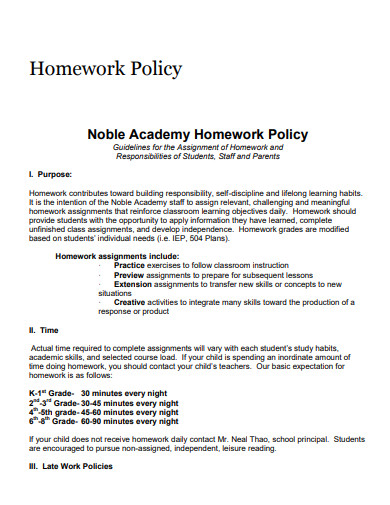
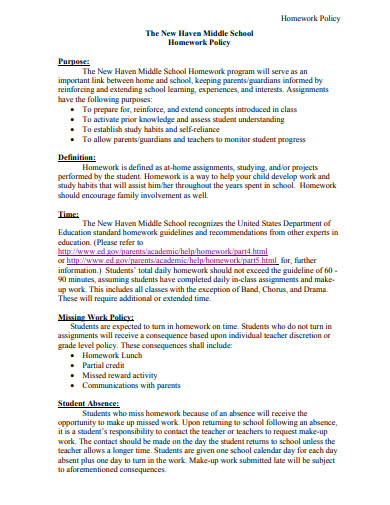
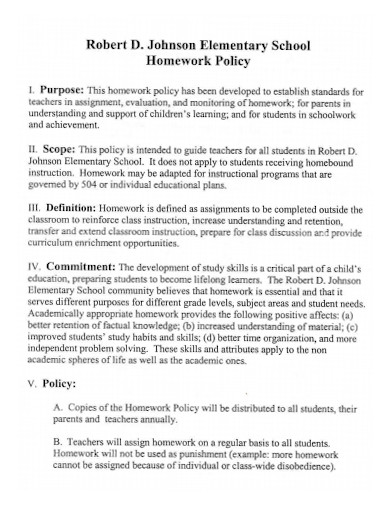
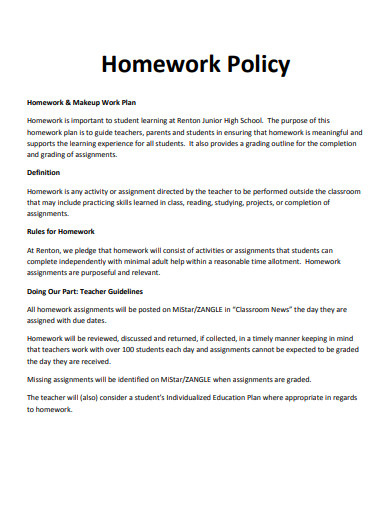
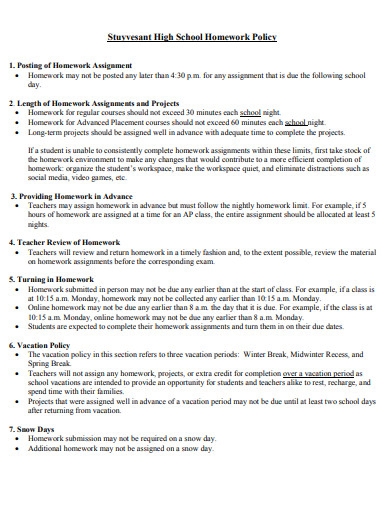
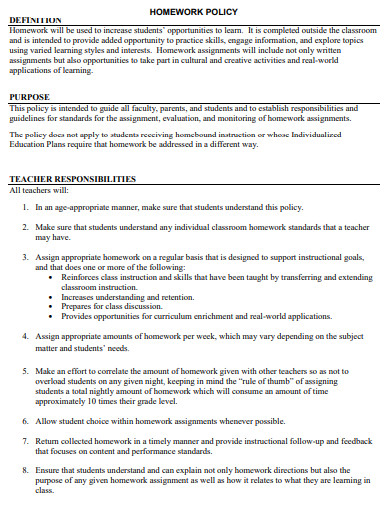
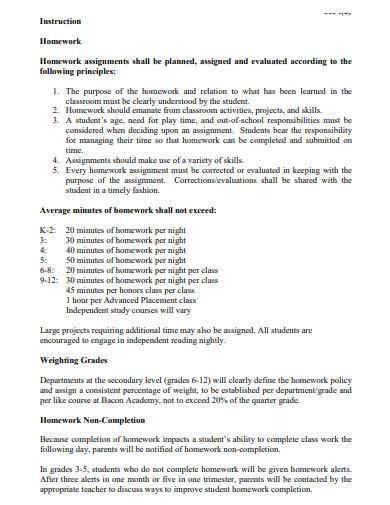
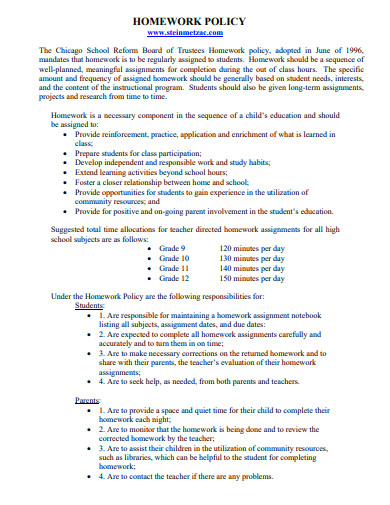
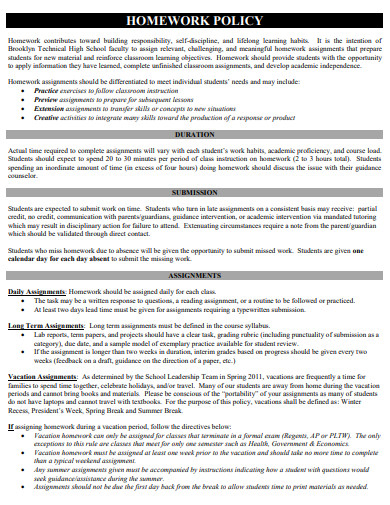
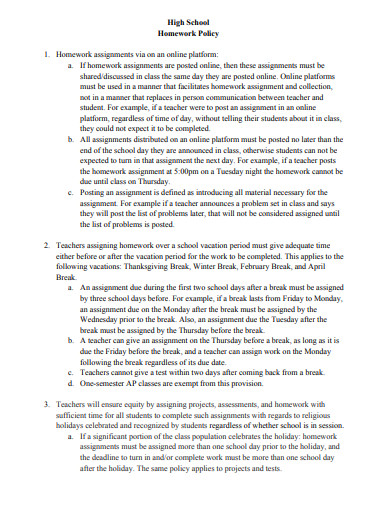
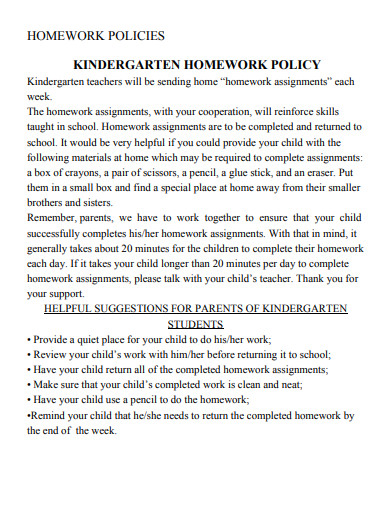




IMAGES
VIDEO
COMMENTS
An example of practice homework is math workbooks. Usually, a teacher will complete the math task in class so students know how to do it, then give them a workbook of 20 - 50 tasks to complete overnight to reinforce the task. The benefit of practice homework is that it can certainly help students commit what they learned in class to memory.
Here's how it works: first, set a timer for 25 minutes. This is going to be your work time. During this 25 minutes, all you can do is work on whatever homework assignment you have in front of you. No email, no text messaging, no phone calls—just homework. When that timer goes off, you get to take a 5 minute break.
The following are common examples of homework. Checking for understanding assignments that a teacher uses to gauge learning needs. Coding assignments. Community service projects. Concept mapping tasks. Cooperative and collaborative tasks. Creative assignments such as brainstorming.
1. Less is More. A 2017 study analyzed the homework assignments of more than 20,000 middle and high school students and found that teachers are often a bad judge of how long homework will take. According to researchers, students spend as much as 85 minutes or as little as 30 minutes on homework that teachers imagined would take students one ...
Optimal time per night spent on homework varies with grade level. For, primary, upper elementary, middle school, and high school grades, the optimal time is about 20, 40, 60, and 90 minutes, respectively. Homework is given often. Reports indicate that students may get as many 400 assignments per year in grades 7-10.
Create a board game. Complete a quiz - you could also ask students to write the quiz in groups and then swap and complete for homework. Write a lesson plan for teaching the topic to a younger class. Teach the teacher - create a poster, Complete a series of exercises. Complete a family tree, real or imaginary.
Sample School Homework Policy . Homework is defined as the time students spend outside the classroom in assigned learning activities. Anywhere Schools believes the purpose of homework should be to practice, reinforce, or apply acquired skills and knowledge. We also believe as research supports that moderate assignments completed and done well ...
Common preparatory homework examples include learning vocabulary or reading a textbook chapter before the content is to be discussed the next day. A few tips for children doing preparatory homework: ... Some children focus best right after school, while others are most alert after dinner and activities. Figure out the best time of day for ...
Step Three. Third, some students may be quite unhappy when being mandated to do specific work. Therefore, teachers should stress the choices a student gets when completing their homework and that students get to complete the work that best reflects their own sense of self. Step Four. Finally, the teacher should praise students individually, as ...
Go on a treasure hunt. As a fun homework task that will get your students out and about, ask them to go on a treasure or scavenger hunt, finding certain things that are related to your topic. For younger children, this could be as simple as collecting leaves, flowers, or twigs they might find in their local park, or particular shapes or colours ...
June 22, 2012. One thing that teaches the lessons of accountability, responsibility, diligence and an appreciation for knowledge is homework. Every student has to do it, and for most kids, it is a necessity in order to do well in school. But its usefulness and whether it's taken seriously are always topics of conversation among students.
The challenge: Managing time and staying organized. Some kids struggle with keeping track of time and making a plan for getting all of their work done. That's especially true of kids who have trouble with executive function. Try creating a homework schedule and set a specific time and place for your child to get homework done.
Examples of Homework. These examples cover a wide range of subjects and complexity levels, reflecting the variety of homework assignments students might encounter throughout their educational journey. Elementary School Homework. Spelling lists to memorize for a test; Math worksheets for practicing basic arithmetic operations
The National PTA and the National Education Association support the " 10-minute homework guideline "—a nightly 10 minutes of homework per grade level. But many teachers and parents are quick to point out that what matters is the quality of the homework assigned and how well it meets students' needs, not the amount of time spent on it.
Too much homework may diminish its effectiveness. While research on the optimum amount of time students should spend on homework is limited, there are indications that for high school students, 1½ to 2½ hours per night is optimum. Middle school students appear to benefit from smaller amounts (less than 1 hour per night).
sample size of 862 students in elementary through postsecondary school. Across these studies, homework assignments yielded an effect size of d=0.229. While the authors did not find statistically significant differences in grade-level effects, they nevertheless concluded that "homeworkworks well in upper grade
Primary school. Shadwell Primary School in Leeds has a homework policy that covers: When pupils take books home for reading. How long they should spend reading at home. English and maths homework. Spelling and times tables expectations. Additional half-termly homework tasks, such as a learning log and key instant recall facts.
Homework has its pros and cons, especially for college students. It can enhance critical thinking, time management, and learning, but it also brings stress, impacts mental health, and can become overwhelming. Finding the right balance is key. Focus on quality assignments, maintain flexibility, and make sure your homework complements rather than ...
Homework assignments should be coordinated by the teacher (s) and should be within the limit of expected probability for accomplishment by the student. Homework should help the student to: 1. Learn to work independently and become self-reliant. 2. Think, plan, organize and apply.
A homework contract is an agreement that outlines what you and your child will do to make sure homework gets done on time and well. It can help your child develop good study habits and become a more independent learner. Homework contracts can also outline rewards and consequences for kids when they follow or don't follow their part of the ...
Here are a couple of thinking questions you could give as homework. 'Think about the best things about your country. Explain them to yourself in English. You'll tell the class about it tomorrow.'. 'Think about the most important person in your life and why they are/were important. Describe them to yourself in English.
At the high school level, the purposes of homework include: Practice/Review - to reinforce and/or master basic skills already presented in class. Preparation - to introduce material to be presented in future lessons. Extension - to provide students with opportunities to transfer specific skills or concepts to new situations.
Step 4: Add the Homework Policy to the Student and Teacher Handbook. To make the homework policy an official school policy, integrate it into the teacher and student handbook. In doing so, both faculty and students will be more aware of it. That way, the homework policy will slowly but surely become a norm in your school.
As students prepare to go back to school, finding reliable online homework help services can be a challenge.. Websites touting "homework help," for example, are often obscuring dicey services that ...